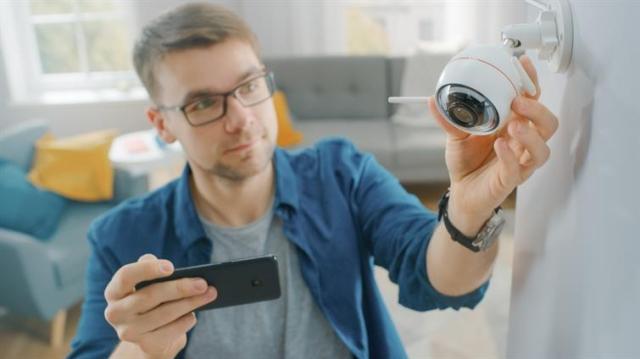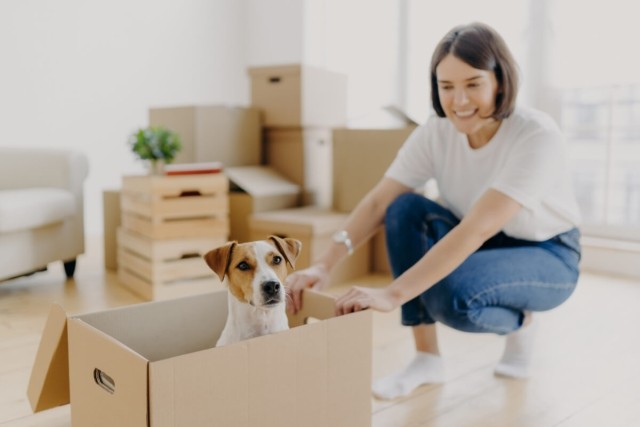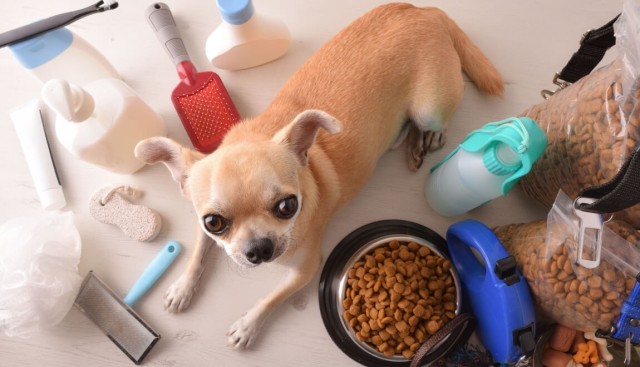There’s a lot to keep in mind when you’re touring apartments, but it’s vital that you don’t forget to inquire about safety features. The safety of a property can be a determining factor in whether to rent there. Jot this list down to make sure your potential apartment has these safety amenities.
Safety Features to Look for When Touring Apartments
Proper lighting
Renting in a properly lit building is extremely important. All entrances and exits to the building(s) and your home should be well-lit and not secluded or hidden. The next important space to check for proper lighting is parking garages and parking lots. These should have lights on 24/7 and feel secure no matter the time of day. Open-air parking lots need to be equipped with streetlamps while parking garages should be filled with bright overhead lights. If you can, drive by the property at night to see what the parking area looks like when it’s dark.
Don’t forgot to check the lighting in other areas. The lights should always be on in hallways, breezeways, and stairwells. Other common areas, like mailrooms, storage facilities, laundry rooms, etc., should have motion detection lights at the very least. You should never be fumbling around in the dark trying to turn on lights in common areas.
Working security cameras
Security cameras should be installed as a part of your apartment’s security system. All common areas, especially elevators, parking lots, stairwells, and hallways, should have visible, functioning security cameras. If you live in a building where you have to enter and exit through a lobby, all the entrances and exits should be equipped with security cameras. If you live in a walk-up apartment, consider installing your own apartment security camera above your door or a video doorbell.
Gated entry or on-site security
During your apartment tour, ask about existing security measures like a security guard, concierge service, locks, and gated areas your community might have. Parking areas should be gated, locked, and only accessible by a key fob or code. If you live in a walk-up apartment community, it’s best for the neighborhood to be gated. Some communities will have a security guard patrol the complex at night or be on guard in the lobby. Other places might have a 24-hour concierge service to monitor who is coming and going and to answer emergency requests. If there is not someone on duty 24/7, there should be extra precautions in place. If applicable, all entrances and exists to the inside of the building should be locked and only accessible by key. In all cases, your landlord should provide you with emergency contacts for maintenance emergencies.
Key access for common areas
Your building or complex should require key access for all common areas, including pools, gyms, and recreation spaces. Your lease or community rules should state how many guests per tenant are allowed in these spaces as well as the rules about what is and is not permitted in common rooms. In buildings with elevators, your key fob should have to be scanned before you can click a button on the elevator. Some apartment buildings even program key fobs to only work for the tenant’s specific floor and the floors with common areas. If you’re looking at walk-up apartment communities, a gated complex provides extra safety.
Take note of entrance and exit points and who has access to them. If you live in a high-rise or mid-rise building, it’s common to have stairs that lead outside. All doors should lock behind you so no one can enter from outside. Be wary of any building that has dimly lit or hidden entrances. If you live in a walk-up apartment, be aware of how many exit doors you have, and if they feel secluded.
Fire escape plans
It’s vital to know what specific evacuation plan is in place for your building. Ask your landlord where the plan is posted and to explain it to you. Voice any personal questions or concerns if you feel that you are not able to evacuate safely under their guidelines.
Smoke and carbon monoxide detectors in apartment
The details of this vary by state, but most apartment units are required to have functioning smoke and carbon monoxide detectors. Ask your potential landlord about where they are and how often checks are done. Again, this depends on what state you live in, but landlords are normally required to run routine checks on detectors during specific times of the year.
Sprinkler systems
Sprinkler systems and how often they are checked also varies by state. Ask your potential landlord if sprinkler systems are in place and check with your state laws on whether it’s required.
Fire extinguisher in apartment
Even if it’s not required for your landlord to provide a fire extinguisher, it’s essential that you have an ABC fire extinguisher in your apartment. If you’re using one provided by your landlord, ask when it was tested last as they have a large expiration range of five to 15 years. Then, make sure you know how to properly operate it.
Neighborhood safety
If you’re not familiar with the neighborhood you’re potentially moving to, have a look around. You should feel safe and secure walking around your neighborhood, and you should have easy access to essential stores, restaurants, parks, public transportation, etc. Write down the places you want easy access to and see if they are going to be accessible to you.
How to Stay Safe and Secure in Your Apartment
You shouldn’t stop thinking about apartment security after your tour. While your landlord should make the common areas safe, it’s your responsibility to keep your home as safe as possible.
Get renters insurance
Unfortunately, some things are out of our control, making renters insurance necessary. Protect yourself from unforeseen events by purchasing a renters insurance plan. Hopefully, you won’t have to use it, but renters insurance covers personal liability, personal property, and relocation costs. If someone gets injured in your apartment, your items get ruined in a fire or similar disaster, or you have to relocate for safety reasons, renters insurance protects you from covering the costs out of pocket.
Lock apartment doors
Even if you’re home, running to the mailbox, or walking to the dumpster, always keep your doors locked. It may seem silly to lock your door if you’re just running out for a few minutes, but you don’t want to take chances when it comes to your safety.
If you have the windows open on a nice day, make sure to close and lock them before nighttime and when you leave your apartment. Along with locking windows, make sure your blinds or drapes are drawn at night whether you’re home or not.
Add extra locks to doors and windows
There are countless renter-friendly locks and security bars that can be added to your apartment doors and windows for another layer of security. Some of the best safety features for apartment doors include portable locks that can be slipped into your door, security bars placed between doorknobs and the ground, sash jammers that prevent doors from being pushed in, and removable security bars that are placed on sliding glass door tracks to prevent them from opening. To protect important documents and valuables, invest in a fireproof safe. Put the safe in a secure location in your apartment, keep the main key on your keychain, and leave the extra key in a hidden place in your apartment or with a trusted individual.
Be careful with candles
Everyone loves scented candles, but they can cause some serious problems if left unattended. Place burning candles out of the reach of children and pets and keep them far away from flammable items like drapes and tablecloths. Of course, blow out your candles before you leave the house. If you’re still wary of the open flame, good alternatives to candles include oil diffusers, wax melts, and fragrance oil sticks.
Install smart cameras, doorbells, bulbs, and locks
Smart cameras and doorbells are a great addition to an apartment security system. They can connect to smart locks and give you peace of mind while being incredibly convenient. Gone are the days of hiding keys under the mat and peeking out the window to see who’s at the door when you have smart locks and cameras. Smart devices typically must be installed, making them not so renter friendly. You can ask for permission from your landlord to install or purchase renter-friendly holders for these devices.
Another great piece of smart technology to invest in is smart bulbs. They can be turned on or off from your smart device, so you never have to walk into a dark room and fumble around for the light switch again. They can also be switched on while you’re away, giving the illusion that someone is home.
Safety Tips for Living Alone
Living alone is an incredibly liberating experience, but you still want to remain safe while reveling in your independence. Keep in mind a few additional safety measures when you’re renting alone.
Get to know your neighbors
If you feel comfortable with it, try to get to know your neighbors. Chat with them when you see them collecting their mail, in the stairwells, or hanging out at the pool. You don’t have to be best friends, but you can keep an eye out for each other. Your neighbor sees your apartment every day and probably has a good idea of your schedule, so they’re your first line of defense if something seems amiss.
Have a check-in system
When you live alone, you should have a check-in system. No matter how old you are, something could happen to you in your home, and you’ll want to get help immediately. Have a check-in system where you call or text a neighbor, family member, or friend at a certain time each day. If they don’t hear from you, they’ll know something is up and can come check-in on you or contact your landlord for a wellness check.
Be careful with your keys
There should only be two keys to your apartment. You should always have the main apartment key on you, and you should leave a spare key with a trusted individual. Other than that, no one (besides your landlord) should have a key to your apartment.
Create a contingency plan
You never know what can happen; preparing for the worst-case scenario sounds negative, but it’s important to be prepared. It’s a good idea to never completely run out of essential items and medications. Consider keeping a back-up of essentials, refilling medications ahead of time, and keeping a small stock of canned goods and dry goods at home.
Your contingency plan should make sense for your area. If you live in a place known for hurricanes, tornadoes, earthquakes, forest fires, etc., prepare for them. Know and practice your evacuation plan and make or buy an emergency kit specific for natural disasters common to your area.
Have a first aid kit
Whether you add it to your natural disaster kit or make a separate kit, every renter needs a first aid kit. It should include items like an emergency food supply, flashlight, crank radio, batteries, and medical supplies. The Red Cross has a list of what should be included in a first aid kit.
Kitchen Safety Tips
The fire extinguisher — provided by your landlord or purchased by yourself — should be placed in the kitchen, and you and everyone in your household should know how to use it. Hopefully, having to use a fire extinguisher is the worst-case scenario. Avoid a kitchen disaster by knowing how to prevent common kitchen hazards.
Remain in the kitchen and monitor your food while it’s cooking and set a timer to remind yourself when to take food out to prevent burning. Be very cautious when dealing with oil; always cover the pot with a lid, wear heat protection on your hands, and never use water to put out a grease fire (use the ABC extinguisher instead). Prevent slips, cuts, and burns by being alert when using sharp utensils, handling hot food and liquids, and washing dishes. The kitchen can be quite hazardous if you’re not careful; avoid a painful and costly incident by being as safe as possible in the kitchen.
Bathroom Safety Tips
Your bathroom should be added to your apartment safety checklist. Prevent falls and slips by adding non-slip mats to the bottom of tubs and shower stalls and place absorbent bathmats in front of showers and sinks to prevent slips outside the shower.
If you store medications and cleaning solutions in your bathroom, make sure the bottles are closed, clearly labeled, and out of the way of children and pets in a shut cabinet or drawer.
No one likes thinking about worst-case scenarios, but properly preparing for them could save you from some potentially disastrous situations. Hopefully, these tips give you peace of mind and keep you safe during your renter journey.






